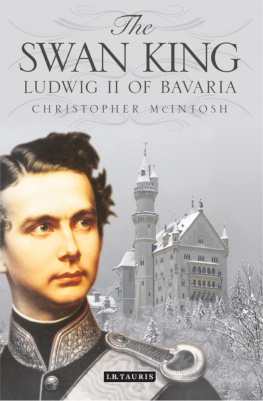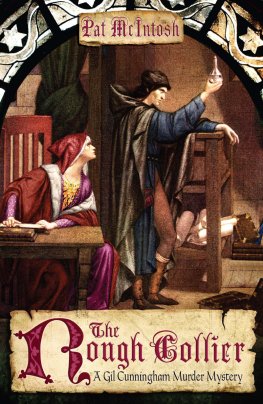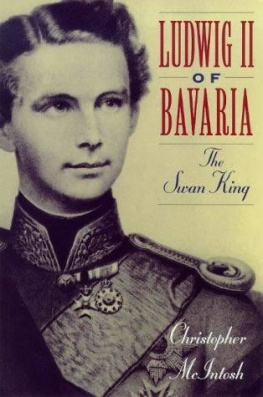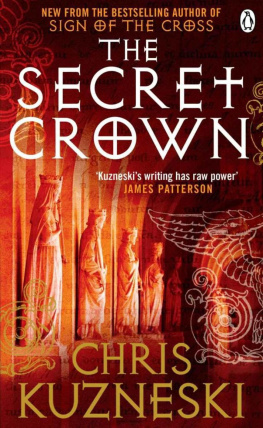Christopher McIntosh - The swan king : Ludwig II of Bavaria
Here you can read online Christopher McIntosh - The swan king : Ludwig II of Bavaria full text of the book (entire story) in english for free. Download pdf and epub, get meaning, cover and reviews about this ebook. year: 2012, genre: Non-fiction. Description of the work, (preface) as well as reviews are available. Best literature library LitArk.com created for fans of good reading and offers a wide selection of genres:
Romance novel
Science fiction
Adventure
Detective
Science
History
Home and family
Prose
Art
Politics
Computer
Non-fiction
Religion
Business
Children
Humor
Choose a favorite category and find really read worthwhile books. Enjoy immersion in the world of imagination, feel the emotions of the characters or learn something new for yourself, make an fascinating discovery.
- Book:The swan king : Ludwig II of Bavaria
- Author:
- Genre:
- Year:2012
- Rating:3 / 5
- Favourites:Add to favourites
- Your mark:
- 60
- 1
- 2
- 3
- 4
- 5
The swan king : Ludwig II of Bavaria: summary, description and annotation
We offer to read an annotation, description, summary or preface (depends on what the author of the book "The swan king : Ludwig II of Bavaria" wrote himself). If you haven't found the necessary information about the book — write in the comments, we will try to find it.
The swan king : Ludwig II of Bavaria — read online for free the complete book (whole text) full work
Below is the text of the book, divided by pages. System saving the place of the last page read, allows you to conveniently read the book "The swan king : Ludwig II of Bavaria" online for free, without having to search again every time where you left off. Put a bookmark, and you can go to the page where you finished reading at any time.
Font size:
Interval:
Bookmark:

Christopher McIntosh was born in England in 1943 and grew up in Edinburgh. He studied Philosophy, Politics and Economics at Oxford University and German at London University. Later, he returned to Oxford to take a doctorate in History. As a writer, he has specialized in the history of ideas, central European history and the Western esoteric tradition. In addition to The Swan King, he has written two books on the Rosicrucians, a biography of the French occultist Eliphas Lvi and Gardens of the Gods (I.B.Tauris).

of Bavaria in his Generals uniform, in a portrait by F. Piloty of 1865.
SWAN KING
LUDWIG II OF BAVARIA
CHRISTOPHER McINTOSH

New revised edition published in 2012 by I.B.Tauris & Co Ltd
6 Salem Road, London W2 4BU
175 Fifth Avenue, New York NY 10010
www.ibtauris.com
Distributed in the United States and Canada Exclusively by Palgrave Macmillan
175 Fifth Avenue, New York NY 10010
First published by Tauris Parke Paperbacks in 2003
Copyright Christopher McIntosh, 1982, 1997, 2003, 2012
The right of Christopher McIntosh to be identified as the author of this work has been asserted by the author in accordance with the Copyright, Designs and Patents Act 1988.
All rights reserved. Except for brief quotations in a review, this book, or any part thereof, may not be reproduced, stored in or introduced into a retrieval system, or transmitted, in any form or by any means, electronic, mechanical, photocopying, recording or otherwise, without the prior written permission of the publisher.
ISBN: 978 1 84885 847 3
eISBN: 978 0 85773 257 6
A full CIP record for this book is available from the British Library
A full CIP record is available from the Library of Congress
Library of Congress Catalog Card Number: available
King Ludwig II of Bavaria in his Generals uniform, in a portrait by F. Piloty of 1865 (Werner Neumeister).
. King Ludwig I of Bavaria (published by permission of His Royal Highness Franz Herzog von Bayern).
. King Maximilian II and Queen Marie (H.R.H. Franz Herzog von Bayern).
. Ludwig and his brother Otto (H.R.H. Franz Herzog von Bayern).
. A childhood drawing by Ludwig, evincing his early love of swans.
. Neuschwanstein castle (Deutsche Zentrale Tourismus).
. Neuschwanstein: The Singers Hall (Werner Neumeister).
. Linderhof palace (Werner Neumeister).
. Herrenchiemsee: The Hall of Mirrors (Werner Neumeister).
. Richard Wagner knocking on the door of the royal treasury: A cartoon from the Munich satirical newspaper Punsch.
. An entry, written in French, in Ludwigs secret diary.
. A cartoon showing Ludwig as the Swan Knight, Lohengrin.
. Ludwig photographed near the end of his life (H.R.H. Franz Herzog von Bayern).
. An artists impression of Ludwigs last moments (H.R.H. Franz Herzog von Bayern).
. The funeral procession in Munich, 19 June 1886 (H.R.H. Franz Herzog von Bayern).
. Design for Falkenstein castle by Christian Jank (Werner Neumeister).
. Bavaria.
There is a Swan whose name is Ecstasy
Aleister Crowley, The Book of Lies
I n the period of nearly three decades since the first edition of this book was published, the figure of King Ludwig II has exerted an ever more powerful fascination and attracted an increasing number of admirers. He features in books, articles, television programmes, films, plays and even a musical. And, in the age of the internet, a search under his name will reveal thousands of entries. At the same time, research on him has advanced considerably since this book first appeared. This new edition gives me the opportunity to present a fuller and more up-to-date view of Ludwig and the various areas of controversy connected with him.
There are four areas of his life that are particularly controversial. First, there has been a persistent rumour that his father was not Crown Prince (later King) Maximilian but rather the dashing royal adjutant Baron Ludwig von der Tann or possibly the Italian Joseph Tambosi, who was a butler in the royal household. According to one theory, Maximilian was not in possession of full potency and von der Tann was asked to ensure the succession. These theories are highly speculative, but I have mentioned them briefly in the chapter on Ludwigs birth and childhood.
The second area of controversy is Ludwigs supposed homosexuality, which is widely taken for granted, although many of his devotees deny it vehemently. Again, this subject has been much written about lately, and much new alleged evidence has come to light. While I have already written about this question in the earlier edition, I now do so more fully in .
A third topic of controversy is the question of whether Ludwig was mad or not, and, if so, what the cause of his madness might have been. The story has often been told of his dethronement on the grounds of a psychological assessment that pronounced him insane, but there are many who reject the madness theory and dismiss the assessment as part of a plot against him. The possibility that his condition was due to syphilis has been aired a number of times, but one recent author on Ludwig who rejects this theory is Heinz Hnfer, Emeritus Professor of Psychiatry at the University of Heidelberg, who has examined this question very thoroughly in his book Ein Knig wird beseitigt. Ludwig II von Bayern (A King is Removed. Ludwig II of Bavaria). In I shall return to the subject of Ludwigs mental and physical health, examining the question in greater detail than in the earlier edition.
The fourth and perhaps most hotly debated issue concerns the cause and circumstances of his death in Lake Starnberg on 13 June 1886. Essentially the speculations on this subject boil down to three basic theories: (a) the murder theory; (b) the theory that Ludwig died accidentally while trying to escape; (c) the suicide theory. The murder theory is a favourite among Ludwigs devotees, but I find it unconvincing for the reasons I give in . The second theory has a romantic quality, but there is little solid evidence to support it. On balance, I continue to believe that Ludwig entered the lake with the intention of committing suicide. This seems to me his most probable motive, given the intensely humiliating and hopeless situation in which he had been placed. Clearly a struggle then took place between the King and his doctor. I have suggested what might have ensued in the struggle, ending in the deaths of both men, but I do not claim that this is anything more than speculation. I have not changed my position on this since the earlier edition, but I have reported on various recent pronouncements on the subject.
A further area where I felt some updating was necessary was in connection with the legend of Ludwig, which even in his lifetime had begun to outgrow the man himself and since his death has grown continuously. Herein lies one of the main reasons why I was attracted to the subject of Ludwig in the first place. I have long been fascinated by the borderland between history and myth by the way in which history turns into myth and myth in turn influences history. This is a process which is not yet sufficiently understood, although it continually propels historical events and shapes the way we perceive them. One way in which it manifests itself is with national heroes or heroines, who often assume a mythical dimension out of proportion to the reality. We saw this, for example, towards the end of the last century with the near deification of Princess Diana to the point where a Pakistani waiter in a Hamburg restaurant told me that, out of grief over her death, he had taken two days sick leave. Royalty are, of course, especially likely to be objects of this sort of mythologizing because of the exalted aura that their role gives them. If you add, as in the case of Ludwig, a highly eccentric personality to the point of suspected madness, a passion for creating astonishing buildings, a key role in the life of a great composer (Wagner), alleged homosexual leanings, rumours concerning his parentage, and a mysterious, tragic and premature death, then you have a recipe for a legend of enduring fascination. Accordingly, I have extended the Epilogue to take account of the continuing cult of Ludwig. At various other points in the book I have made changes and corrected what I felt to be omissions in the earlier version.
Font size:
Interval:
Bookmark:
Similar books «The swan king : Ludwig II of Bavaria»
Look at similar books to The swan king : Ludwig II of Bavaria. We have selected literature similar in name and meaning in the hope of providing readers with more options to find new, interesting, not yet read works.
Discussion, reviews of the book The swan king : Ludwig II of Bavaria and just readers' own opinions. Leave your comments, write what you think about the work, its meaning or the main characters. Specify what exactly you liked and what you didn't like, and why you think so.













